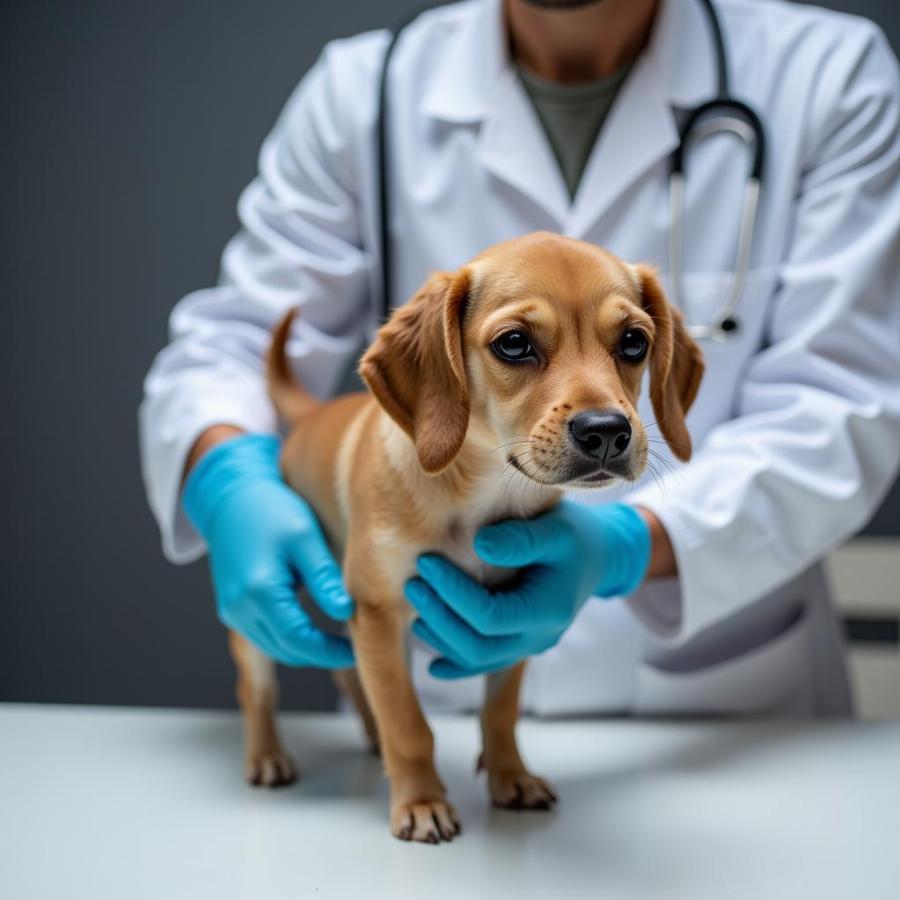Discovering your furry friend has parvo can be heartbreaking. This highly contagious virus poses a serious threat to unvaccinated dogs, especially puppies. While professional veterinary care is crucial for parvo treatment, you might wonder about the possibilities and limitations of dogs with parvo home treatment.
This article delves into essential information about managing parvo at home, the critical role of veterinarian guidance, and steps to provide supportive care for your canine companion.
Understanding Canine Parvovirus
Canine parvovirus attacks rapidly dividing cells in a dog’s body, primarily affecting the digestive system. This leads to severe symptoms such as:
- Lethargy and weakness
- Loss of appetite
- Severe vomiting
- Bloody diarrhea
- Dehydration
Parvo is highly contagious and spreads through contact with infected feces, vomit, or contaminated surfaces. Puppies, unvaccinated dogs, and breeds like Rottweilers, Doberman Pinschers, and German Shepherds are particularly susceptible.
The Importance of Veterinary Care
While home remedies can offer supportive care, it’s crucial to understand that there is no cure for parvo. Effective treatment involves addressing the symptoms and providing the dog’s immune system with the best chance to fight the virus.
Veterinary intervention is essential for the following:
- Diagnosis: Confirming parvo through fecal testing or other diagnostic methods.
- Intensive Care: Hospitalization often provides intravenous fluids, electrolytes, anti-nausea medication, and antibiotics to combat secondary infections.
- Monitoring: Close observation of vital signs and timely adjustments to treatment.
Dogs with Parvo Home Treatment: Supportive Care
Consulting your veterinarian before starting any home treatment is vital. Based on your dog’s condition and the severity of the case, your vet might suggest some supportive measures to administer at home alongside professional treatment:
- Isolation: Isolate your infected dog from other dogs to prevent the virus’s spread.
- Hydration: Offer small amounts of water or electrolyte solutions frequently to combat dehydration caused by vomiting and diarrhea. Your vet can guide you on the appropriate type and amount of fluids.
- Nutrition: Withhold food if your dog is vomiting, and gradually reintroduce bland, easily digestible foods like boiled chicken and rice as the vomiting subsides.
- Hygiene: Maintain impeccable hygiene. Parvovirus is resilient and can survive in the environment for months. Thoroughly disinfect all surfaces, bedding, and toys that your infected dog has come into contact with. Use a bleach solution as recommended by your veterinarian.
What NOT to Do When Treating Parvo at Home
While the internet is flooded with home remedies for parvo, it’s crucial to exercise extreme caution. Never administer any medications or treatments without explicit instructions from your veterinarian. Some seemingly harmless home remedies can be detrimental to a dog already battling parvo.
FAQs About Dogs with Parvo Home Treatment
Can I give my dog over-the-counter medication for parvo?
No, never give your dog any medication without consulting your vet. Human medications can be toxic to dogs.
How long does it take for a dog to recover from parvo with home treatment?
Recovery time varies depending on the severity of the infection and the dog’s overall health. With veterinary care and supportive home treatment, dogs can recover within a week or two.
What are the chances of survival for a dog with parvo?
With prompt veterinary care and supportive treatment, the survival rate for dogs with parvo is relatively high, ranging from 70% to 90%.
 Veterinarian Examining a Dog for Parvovirus
Veterinarian Examining a Dog for Parvovirus
When can I consider my dog with parvo to be non-contagious?
A dog that has recovered from parvo can shed the virus for several weeks. Your veterinarian can advise you on the appropriate isolation period and when it’s safe to reintroduce your dog to other dogs.
Supporting Your Dog’s Recovery
Parvo is a severe illness, and early intervention significantly increases the chances of recovery. Alongside veterinary care, providing a clean, comfortable, and stress-free environment is essential. Love, attention, and consistent supportive care can go a long way in helping your furry friend combat this challenging virus.
Remember, dogs with parvo home treatment should always be administered under the guidance of a qualified veterinarian.
Need More Advice on Dog Health?
Check out our other helpful articles:
Beaut Dogs is your trusted source for reliable information on dog health, care, and well-being. If you have any concerns about your dog’s health, please contact us at [email protected] for expert advice and support.